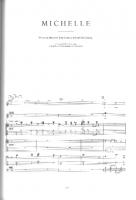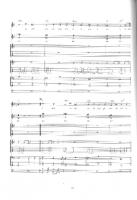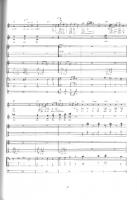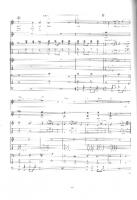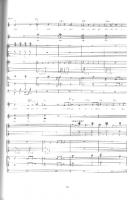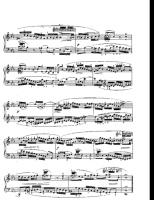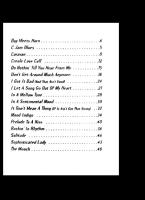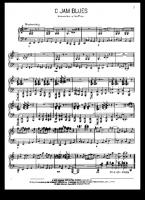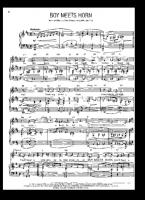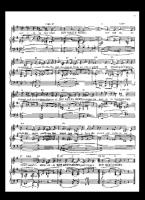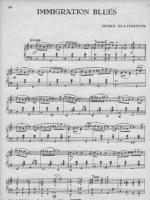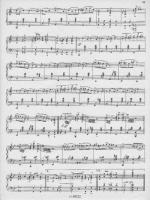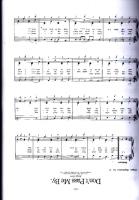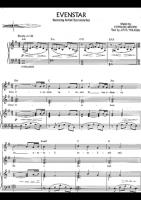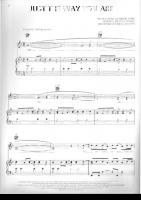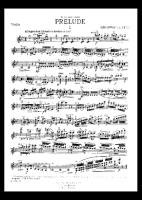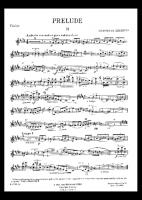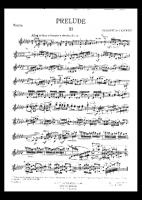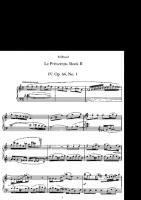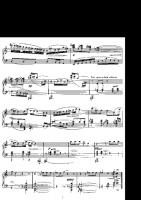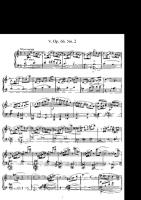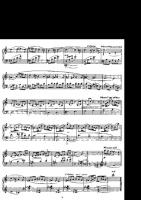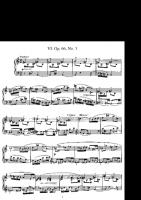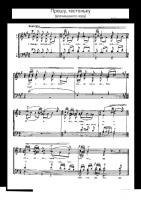Latest Sheets
The Beatles
 The Beatles were a pop and rock group from Liverpool, England formed in 1960. Primarily consisting of John Lennon (rhythm guitar, vocals), Paul McCartney (bass guitar, vocals), George Harrison (lead guitar, vocals) and Ringo Starr (drums, vocals) throughout their career, The Beatles are recognised for leading the mid-1960s musical "British Invasion" into the United States. Although their initial musical style was rooted in 1950s rock and roll and homegrown skiffle, the group explored genres ranging from Tin Pan Alley to psychedelic rock. Their clothes, styles, and statements made them trend-setters, while their growing social awareness saw their influence extend into the social and cultural revolutions of the 1960s. After the band broke up in 1970, all four members embarked upon solo careers.
The Beatles were a pop and rock group from Liverpool, England formed in 1960. Primarily consisting of John Lennon (rhythm guitar, vocals), Paul McCartney (bass guitar, vocals), George Harrison (lead guitar, vocals) and Ringo Starr (drums, vocals) throughout their career, The Beatles are recognised for leading the mid-1960s musical "British Invasion" into the United States. Although their initial musical style was rooted in 1950s rock and roll and homegrown skiffle, the group explored genres ranging from Tin Pan Alley to psychedelic rock. Their clothes, styles, and statements made them trend-setters, while their growing social awareness saw their influence extend into the social and cultural revolutions of the 1960s. After the band broke up in 1970, all four members embarked upon solo careers.The Beatles are one of the most commercially successful and critically acclaimed bands in the history of popular music, selling over a billion records internationally. In the United Kingdom, The Beatles released more than 40 different singles, albums, and EPs that reached number one, earning more number one albums (15) than any other group in UK chart history. This commercial success was repeated in many other countries; their record company, EMI, estimated that by 1985 they had sold over one billion records worldwide. According to the Recording Industry Association of America, The Beatles have sold more albums in the United States than any other band. In 2004, Rolling Stone magazine ranked The Beatles number one on its list of 100 Greatest Artists of All Time. According to that same magazine, The Beatles' innovative music and cultural impact helped define the 1960s, and their influence on pop culture is still evident today. In 2008, Billboard magazine released a list of top-selling Hot 100 artists to celebrate the chart's fiftieth anniversary; The Beatles reached #1 again.
J. S. Bach
Johann Sebastian Bach (21 March 1685, O.S.31 March 1685, N.S. – 28 July 1750, N.S.) was a German composer, organist, harpsichordist, violist, and violinist whose sacred and secular works for choir, orchestra, and solo instruments drew together the strands of the Baroque period and brought it to its ultimate maturity. Although he did not introduce new forms, he enriched the prevailing German style with a robust contrapuntal technique, an unrivalled control of harmonic and motivic organisation, and the adaptation of rhythms, forms and textures from abroad, particularly from Italy and France.
Revered for their intellectual depth, technical command and artistic beauty, Bach's works include the Brandenburg Concertos, the Goldberg Variations, the Partitas, The Well-Tempered Clavier, the Mass in B minor, the St Matthew Passion, the St John Passion, the Magnificat, A Musical Offering, The Art of Fugue, the English and French Suites, the Sonatas and Partitas for solo violin, the Cello Suites, more than 200 surviving cantatas, and a similar number of organ works, including the famous Toccata and Fugue in D minor and Passacaglia and Fugue in C minor, as well as the Great Eighteen Chorale Preludes and Organ Mass.
Bach's abilities as an organist were highly respected throughout Europe during his lifetime, although he was not widely recognised as a great composer until a revival of interest and performances of his music in the first half of the 19th century. He is now generally regarded as one of the main composers of the Baroque style, and as one of the greatest composers of all time.
Revered for their intellectual depth, technical command and artistic beauty, Bach's works include the Brandenburg Concertos, the Goldberg Variations, the Partitas, The Well-Tempered Clavier, the Mass in B minor, the St Matthew Passion, the St John Passion, the Magnificat, A Musical Offering, The Art of Fugue, the English and French Suites, the Sonatas and Partitas for solo violin, the Cello Suites, more than 200 surviving cantatas, and a similar number of organ works, including the famous Toccata and Fugue in D minor and Passacaglia and Fugue in C minor, as well as the Great Eighteen Chorale Preludes and Organ Mass.
Bach's abilities as an organist were highly respected throughout Europe during his lifetime, although he was not widely recognised as a great composer until a revival of interest and performances of his music in the first half of the 19th century. He is now generally regarded as one of the main composers of the Baroque style, and as one of the greatest composers of all time.
Berklee College Of Music
 Berklee College of Music is an independent music conservatory founded in 1945 in Boston, Massachusetts. There are 4000 registered students.
Berklee College of Music is an independent music conservatory founded in 1945 in Boston, Massachusetts. There are 4000 registered students.
Andrea Ferrante
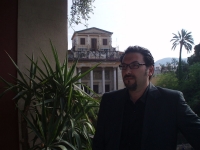 Andrea Ferrante (born 16 August 1968, Palermo, Italy) is an Italian composer whose music is performed throughout Europe, Asia and the Americas and published by Videoradio and Rai Trade Labels, Edizioni Carrara and Edizioni Simeoli. Edizioni Carrara and Edizioni Simeoli.
Andrea Ferrante (born 16 August 1968, Palermo, Italy) is an Italian composer whose music is performed throughout Europe, Asia and the Americas and published by Videoradio and Rai Trade Labels, Edizioni Carrara and Edizioni Simeoli. Edizioni Carrara and Edizioni Simeoli.
Sally DeFord
 Sally DeFord Musical artist Born: 1959 (age 60 years), Eugene, Oregon, United States
Sally DeFord Musical artist Born: 1959 (age 60 years), Eugene, Oregon, United StatesRecord labels: Defordmusic, Defordmusic.com, Sally DeFord Music, Sally DeFord
Genres: Alt Contemporary Christian, Christian/Gospel
Albums: He Is My Song, MORE
Chess
 Chess is a musical with lyrics by Tim Rice and music by Björn Ulvaeus and Benny Andersson, formerly of ABBA. The story involves a romantic triangle between two players in a world chess championship, and a woman who manages one and falls in love with the other. Although the protagonists were not intended to represent any specific individuals, the characters’ personalities are loosely based on those of Victor Korchnoi and Bobby Fischer.
Chess is a musical with lyrics by Tim Rice and music by Björn Ulvaeus and Benny Andersson, formerly of ABBA. The story involves a romantic triangle between two players in a world chess championship, and a woman who manages one and falls in love with the other. Although the protagonists were not intended to represent any specific individuals, the characters’ personalities are loosely based on those of Victor Korchnoi and Bobby Fischer.Following the pattern of Jesus Christ Superstar and Evita, a concept album of Chess was recorded in 1984, and generated a number of hit singles. The first theatrical version of Chess opened in London's West End in 1986 and played for three years. A much-altered production premiered on Broadway in 1988, but most critics gave it a poor reception, and it failed to attract large audiences. In spite of this failure in the United States, Chess, like Candide and other "cult" musicals, is frequently revised for new productions, many of which try to merge elements from both the London and Broadway versions.
Chess came seventh in a BBC Radio 2 listener poll of the United Kingdom's "Number One Essential Musicals."
Mathew Gerard
 Matthew Gerrard is a Canadian record producer and songwriter.Gerrard grew up in Don Mills, a suburb of Toronto's north-east end. He attended George S. Henry Secondary School where he played trombone in band, later playing bass in a school-based 5-piece jazz fusion combo called Nemesis Fusion. Nemesis Fusion competed in two Canadian stage band festivals earning silver in 1982 and won the competition the following year when Gerrard wrote the group's original material. After high school Gerrard was a member of a band called Regatta, which released one self-titled album. He also played bass and toured with Kim Mitchell (former Max Webster lead man) and Von Groove (until the late 1990s/early 2000s).
Matthew Gerrard is a Canadian record producer and songwriter.Gerrard grew up in Don Mills, a suburb of Toronto's north-east end. He attended George S. Henry Secondary School where he played trombone in band, later playing bass in a school-based 5-piece jazz fusion combo called Nemesis Fusion. Nemesis Fusion competed in two Canadian stage band festivals earning silver in 1982 and won the competition the following year when Gerrard wrote the group's original material. After high school Gerrard was a member of a band called Regatta, which released one self-titled album. He also played bass and toured with Kim Mitchell (former Max Webster lead man) and Von Groove (until the late 1990s/early 2000s).
Takeshi Senō
 Takeshi Seno sheet music with the world's largest community of sheet music creators, composers, performers, ...
Takeshi Seno sheet music with the world's largest community of sheet music creators, composers, performers, ...
Hack/sign
Chopin
 Frédéric Chopin (1 March 1810 – 17 October 1849) was a Polish composer and virtuoso pianist of the Romantic period. He is widely regarded as the greatest Polish composer, and ranks as one of music's greatest tone poets.
Frédéric Chopin (1 March 1810 – 17 October 1849) was a Polish composer and virtuoso pianist of the Romantic period. He is widely regarded as the greatest Polish composer, and ranks as one of music's greatest tone poets.He was born in the village of Żelazowa Wola, in the Duchy of Warsaw, to a Polish mother and French-expatriate father, and in his early life was regarded as a child-prodigy pianist. In November 1830, at the age of 20, Chopin went abroad; following the suppression of the Polish November Uprising of 1830–31, he became one of many expatriates of the Polish "Great Emigration."
In Paris, he made a comfortable living as a composer and piano teacher, while giving few public performances. A Polish patriot,
Chopin's extant compositions were written primarily for the piano as a solo instrument. Though technically demanding, Chopin's style emphasizes nuance and expressive depth rather than virtuosity. Chopin invented musical forms such as the ballade and was responsible for major innovations in forms such as the piano sonata, waltz, nocturne, étude, impromptu and prelude. His works are mainstays of Romanticism in 19th-century classical music.
Wilson Pickett
 Wilson Pickett was an American singer and songwriter. A major figure in the development of American soul music, Pickett recorded over 50 songs which made the US R&B charts, many of which crossed over to the Billboard Hot 100
Wilson Pickett was an American singer and songwriter. A major figure in the development of American soul music, Pickett recorded over 50 songs which made the US R&B charts, many of which crossed over to the Billboard Hot 100
Chris Brown
 Christopher Maurice Brown (born May 5, 1989) is a Grammy nominated American R&B and pop singer-songwriter, dancer, music video director and actor. He made his recording debut in late 2005 with Chris Brown at the age of 16. The album featured the hit single "Run It!", which topped the Billboard 100, making Brown the first male artist to have his debut single go to the top. The album sold two million copies in the United States and was subsequently certified multi-platinum by the RIAA.
Christopher Maurice Brown (born May 5, 1989) is a Grammy nominated American R&B and pop singer-songwriter, dancer, music video director and actor. He made his recording debut in late 2005 with Chris Brown at the age of 16. The album featured the hit single "Run It!", which topped the Billboard 100, making Brown the first male artist to have his debut single go to the top. The album sold two million copies in the United States and was subsequently certified multi-platinum by the RIAA.Brown's second studio album, Exclusive was released worldwide in November 2007. It spawned two successful singles; his second US number one hit, "Kiss Kiss" featuring T-Pain. and "With You", which topped out at number 2 on the Billboard Hot 100. The latest single "Forever" was released in May 2008 off the deluxe Exclusive: The Forever Edition and has so far has peaked at number 2 on Billboard Hot 100. Exclusive has gone platinum, moving over one million units.
In addition to his solo commercial success, Brown has been featured on several hits such as "No Air a duet with singer Jordin Sparks, "Shortie like Mine" with the rapper Bow Wow and "Shawty Get Loose" alongside Lil Mama and T-Pain. The songs have topped out #3, #9 and #10 on the Hot 100 respectively. Brown has been compared due to his vocal and dance talents to renowned R&B artists such as Usher and Michael Jackson and has named both as large influences on his music.
Wayne Hooper
 Wayne Hillard Hooper was widely known as a gospel music composer, arranger and as a singer in the King's Heralds quartet for the Voice of Prophecy radio program. During his prolific career he produced nine volumes of gospel hymn vocal arrangements, and a number of solo songs and choral music.
Wayne Hillard Hooper was widely known as a gospel music composer, arranger and as a singer in the King's Heralds quartet for the Voice of Prophecy radio program. During his prolific career he produced nine volumes of gospel hymn vocal arrangements, and a number of solo songs and choral music.
Duke Ellington
 Edward Kennedy "Duke" Ellington (April 29, 1899 â May 24, 1974) was an American composer, pianist, and bandleader.
Edward Kennedy "Duke" Ellington (April 29, 1899 â May 24, 1974) was an American composer, pianist, and bandleader.Recognized during his life as one of the most influential figures in jazz, if not in all American music, Ellington's reputation has increased since his death, including a special award citation from the Pulitzer Prize Board.
Ellington called his style and sound "American Music" rather than jazz, and liked to describe those who impressed him as "beyond category", including many of the musicians who served with his orchestra, some of whom were themselves considered among the giants of jazz and remained with Ellington's orchestra for decades. While many were noteworthy in their own right, it was Ellington that melded them into one of the most well-known orchestral units in the history of jazz. He often composed specifically for the style and skills of these individuals, such as "Jeep's Blues" for Johnny Hodges, "Concerto for Cootie" ("Do Nothing Till You Hear from Me") for Cootie Williams and "The Mooche" for Tricky Sam Nanton. He also recorded songs written by his bandsmen, such as Juan Tizol's "Caravan" and "Perdido" which brought the "Spanish Tinge" to big-band jazz. After 1941, he frequently collaborated with composer-arranger Billy Strayhorn, who he called his alter-ego.
One of the twentieth century's best-known African-American celebrities, Ellington recorded for many American record companies, and appeared in several films. Ellington and his orchestra toured the United States and Europe regularly before and after World War II. Ellington led his band from 1923 until his death in 1974. His son Mercer Ellington took over the band until his death from cancer in 1996. Paul Ellington, Mercer's youngest son, took over the Orchestra from there and after his mother's passing took over the Estate of Duke and Mercer Ellington.
Johannes Bernardus van Bree
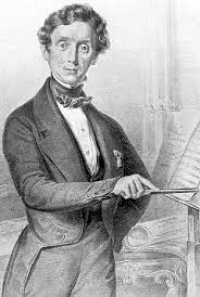 Johannes Bernardus van Bree (29 January 1801 – 14 February 1857) was a Dutch composer, violinist and conductor.
Johannes Bernardus van Bree (29 January 1801 – 14 February 1857) was a Dutch composer, violinist and conductor.Van Bree was born and died in Amsterdam. He was a pupil of Jan George Bertelman.From 1829 to the year of his death he directed the Felix Meritis Society. He was also the director of the Music School of the Society of the Promotion of Music, Amsterdam.As a conductor he gave the Dutch premieres of Berlioz' Symphonie fantastique (in 1855) and Richard Wagner's Faust Overture (1856).
Ringo Starr
 Sir Richard Starkey MBE (born 7 July 1940), known professionally as Ringo Starr, is an English musician, singer, songwriter and actor who gained worldwide fame as the drummer for the Beatles. He occasionally sang lead vocals with the group, usually for one song on each album, including "Yellow Submarine", "With a Little Help from My Friends" and their cover of "Act Naturally". He also wrote and sang the Beatles' songs "Don't Pass Me By" and "Octopus's Garden", and is credited as a co-writer of others.
Sir Richard Starkey MBE (born 7 July 1940), known professionally as Ringo Starr, is an English musician, singer, songwriter and actor who gained worldwide fame as the drummer for the Beatles. He occasionally sang lead vocals with the group, usually for one song on each album, including "Yellow Submarine", "With a Little Help from My Friends" and their cover of "Act Naturally". He also wrote and sang the Beatles' songs "Don't Pass Me By" and "Octopus's Garden", and is credited as a co-writer of others.
Ah Doe
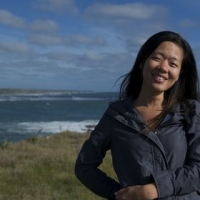 Ah Doe vietnamese musician and composer.
Ah Doe vietnamese musician and composer.
Antonio Cesti
 Pietro Marc'Antonio Cesti, known today primarily as an Italian composer of the Baroque era, was also a singer, and organist. He was "the most celebrated Italian musician of his generation"
Pietro Marc'Antonio Cesti, known today primarily as an Italian composer of the Baroque era, was also a singer, and organist. He was "the most celebrated Italian musician of his generation"
The 25th Annual Putnam County Spelling Bee
 The 25th Annual Putnam County Spelling Bee is a one act musical comedy with music and lyrics by William Finn and a book by Rachel Sheinkin. The show centers around a fictional spelling bee set in a geographically ambiguous Putnam Valley Middle School in Putnam County, NY. Six quirky adolescents compete in the Bee, run by three equally-quirky grown-ups. The spellers learn that winning isn't everything.
The 25th Annual Putnam County Spelling Bee is a one act musical comedy with music and lyrics by William Finn and a book by Rachel Sheinkin. The show centers around a fictional spelling bee set in a geographically ambiguous Putnam Valley Middle School in Putnam County, NY. Six quirky adolescents compete in the Bee, run by three equally-quirky grown-ups. The spellers learn that winning isn't everything.The 2005 Broadway production, directed by James Lapine, has earned good reviews and box-office success and was nominated for six Tony Awards, winning two, including Best Book. The show has spawned various other productions in the U.S., a national tour with performances two in Canada and Australian productions.
An unusual aspect of the show is that three or four real audience members are invited on stage to compete in the spelling bee alongside the six young characters. During the 2005 Tony Awards, former Presidential candidate Al Sharpton competed. Another amusing aspect of the show is that the official pronouncer provides ridiculous usage examples when asked to use words in a sentence. For instance, for the word "palaestra," he says, "Euripides said, 'What happens at the palaestra stays at the palaestra.'" At some shows, adult-only audiences (over age 16) are invited for "Parent-Teacher Conferences," also known as "adult night at the Bee." These performances are peppered with sexual references and profanity inspired by R-rated ad-libs made during rehearsals.
Spelling Bee, together with The Drowsy Chaperone, Xanadu, and others, is part of a Broadway trend to present musicals uninterrupted by an intermission, with a relatively small cast and short running time of less than two hours.
Dj Sammi
 Samuel Bouriah (born 19 October 1969), better known by his stage name DJ Sammy, is a Spanish DJ and record producer. He has released five albums and has had five top-10 hits, including a cover of Bryan Adams' "Heaven", which reached number one in the UK in 2002. His career started with ex-wife Marie-José van der Kolk in the making of his first singles, under the stage name of DJ Sammy featuring Carisma.
Samuel Bouriah (born 19 October 1969), better known by his stage name DJ Sammy, is a Spanish DJ and record producer. He has released five albums and has had five top-10 hits, including a cover of Bryan Adams' "Heaven", which reached number one in the UK in 2002. His career started with ex-wife Marie-José van der Kolk in the making of his first singles, under the stage name of DJ Sammy featuring Carisma.
Celine Dion
 Céline Marie Claudette Dion (born March 30, 1968 in Charlemagne, Quebec) is a Canadian singer, and occasional songwriter and actress.
Céline Marie Claudette Dion (born March 30, 1968 in Charlemagne, Quebec) is a Canadian singer, and occasional songwriter and actress.Dion had first gained international recognition in the 1980s by winning both the 1982 Yamaha World Popular Song Festival and the 1988 Eurovision Song Contest.
Dion's music has been influenced by genres ranging from rock and R&B to gospel and classical, and while her releases have often received mixed critical reception, she is renowned for her technically skilled and powerful vocals.
Bobby Russell
 Bobby Russell was an American singer and songwriter. Between 1966 and 1973, he had five singles on the Hot Country Songs charts, including the crossover pop hit "Saturday Morning Confusion". Russell was married to singer and actress Vicki Lawrence from 1972 to 1974.
Bobby Russell was an American singer and songwriter. Between 1966 and 1973, he had five singles on the Hot Country Songs charts, including the crossover pop hit "Saturday Morning Confusion". Russell was married to singer and actress Vicki Lawrence from 1972 to 1974.
Bach
 Johann Sebastian Bach (31 March 1685 – 28 July 1750) was a German composer and organist whose sacred and secular works for choir, orchestra, and solo instruments drew together the strands of the Baroque period and brought it to its ultimate maturity. Although he introduced no new forms, he enriched the prevailing German style with a robust contrapuntal technique, an unrivalled control of harmonic and motivic organisation in composition for diverse musical forces, and the adaptation of rhythms and textures from abroad, particularly Italy and France.
Johann Sebastian Bach (31 March 1685 – 28 July 1750) was a German composer and organist whose sacred and secular works for choir, orchestra, and solo instruments drew together the strands of the Baroque period and brought it to its ultimate maturity. Although he introduced no new forms, he enriched the prevailing German style with a robust contrapuntal technique, an unrivalled control of harmonic and motivic organisation in composition for diverse musical forces, and the adaptation of rhythms and textures from abroad, particularly Italy and France.Revered for their intellectual depth and technical and artistic beauty, Bach's works include the Brandenburg concertos; the Goldberg Variations; the English Suites, French Suites, Partitas, and Well-Tempered Clavier; the Mass in B Minor; the St. Matthew Passion; the St. John Passion; The Musical Offering; The Art of Fugue; the Sonatas and Partitas for violin solo; the Cello Suites; more than 200 surviving cantatas; and a similar number of organ works, including the celebrated Toccata and Fugue in D Minor.
While Bach's fame as an organist was great during his lifetime, he was not particularly well-known as a composer. His adherence to Baroque forms and contrapuntal style was considered "old-fashioned" by his contemporaries, especially late in his career when the musical fashion tended towards Rococo and later Classical styles. A revival of interest and performances of his music began early in the 19th century, and he is now widely considered to be one of the greatest composers in the Western tradition.
Louis Couperin
 Louis Couperin (French: ; c. 1626 – 29 August 1661) was a French Baroque composer and performer. He was born in Chaumes-en-Brie and moved to Paris in 1650–1651 with the help of Jacques Champion de Chambonnières. Couperin worked as organist of the Church of St. Gervais in Paris and as musician at the court. He quickly became one of the most prominent Parisian musicians, establishing himself as a harpsichordist, organist, and violist, but his career was cut short by his early death at the age of thirty-five.
Louis Couperin (French: ; c. 1626 – 29 August 1661) was a French Baroque composer and performer. He was born in Chaumes-en-Brie and moved to Paris in 1650–1651 with the help of Jacques Champion de Chambonnières. Couperin worked as organist of the Church of St. Gervais in Paris and as musician at the court. He quickly became one of the most prominent Parisian musicians, establishing himself as a harpsichordist, organist, and violist, but his career was cut short by his early death at the age of thirty-five.
Frances Allitsen
 Mary Frances Allitsen was an English composer. One of her most popular songs is a setting of Psalm 27, "The Lord is My Light". Her real name was Mary Bumpus, according to the Oxford Dictionary of National Biography.
Mary Frances Allitsen was an English composer. One of her most popular songs is a setting of Psalm 27, "The Lord is My Light". Her real name was Mary Bumpus, according to the Oxford Dictionary of National Biography.
Piano
11
pages
1.82MB - 582d ago





...
Howard Shore
 Howard Leslie Shore (born October 18, 1946) is a Canadian composer, notable for his film scores. He has composed the scores for over 40 films, most notably the scores for The Lord of the Rings film trilogy, for which he won three Academy Awards. He is also a consistent collaborator with director David Cronenberg, having scored all but one of his films since 1979. Shore has also worked with Martin Scorsese, Jonathan Demme, David Fincher and many other filmakers.
Howard Leslie Shore (born October 18, 1946) is a Canadian composer, notable for his film scores. He has composed the scores for over 40 films, most notably the scores for The Lord of the Rings film trilogy, for which he won three Academy Awards. He is also a consistent collaborator with director David Cronenberg, having scored all but one of his films since 1979. Shore has also worked with Martin Scorsese, Jonathan Demme, David Fincher and many other filmakers.He has also composed a few concert works including one opera, The Fly, based on the plot (though not his score) of Cronenberg's 1986 film premiered at the Théâtre du Châtelet in Paris on 2 July 2008., a short piece Fanfare for the Wanamaker Organ and the Philadelphia Orchestra, and a short overture for the Swiss 21st Century Symphony Orchestra.
Shore is a three-time winner of the Academy Award, and has also won two Golden Globe Awards and four Grammy Awards. He is the uncle of film composer Ryan Shore.
Bruno Mars
 Peter Gene Hernandez (born October 8, 1985), better known by his stage name Bruno Mars, is an American singer-songwriter and music producer. Raised in Honolulu, Hawaii by a family of musicians, Mars began making music at a young age. After performing in various musical venues in his hometown throughout his childhood, he decided to pursue a musical career. Mars began producing songs for other artists, joining production team The Smeezingtons.
Peter Gene Hernandez (born October 8, 1985), better known by his stage name Bruno Mars, is an American singer-songwriter and music producer. Raised in Honolulu, Hawaii by a family of musicians, Mars began making music at a young age. After performing in various musical venues in his hometown throughout his childhood, he decided to pursue a musical career. Mars began producing songs for other artists, joining production team The Smeezingtons.He became recognized as a solo artist after lending his vocals and co-writing the hooks for the songs "Nothin' on You" by B.o.B, and "Billionaire" by Travie McCoy. He also co-wrote the hits "Right Round" by Flo Rida featuring Kesha, "Wavin' Flag" by K'naan, and "Fuck You!" by Cee Lo Green. In October 2010, he released his debut album, Doo-Wops & Hooligans. Anchored by the singles "Just the Way You Are" and "Grenade", the album peaked at number three on the Billboard 200. He has been nominated for seven Grammys at the 53rd Grammy Awards, which will be held on February 13, 2011.
Steven Cravis
 Steven Cravis (born, Lexington, Massachusetts), is a pianist, composer and music producer based in San Francisco, California, who scores for television, film and ringtones as well as releasing new age music with a focus on meditation and relaxation.
Steven Cravis (born, Lexington, Massachusetts), is a pianist, composer and music producer based in San Francisco, California, who scores for television, film and ringtones as well as releasing new age music with a focus on meditation and relaxation.His works include for the award-winning Quell (video game) app, Orisinal, Animal Planet, CBS, CNN, NBC, andMatchroom Sport|UK.
Cravis began taking piano lessons at the age of seven and studied piano performance at the Berklee College of Music in Boston. He has released several albums of peace inspiring, solo piano work including True Reflections (1992), The Sound of Light (1995), Lavender Dreams (2004), Healing Piano (2009) and Cloudwalker (2016).
In 2017 he provided the score for the TV documentary Going the Distance: Journeys of Recovery, about survivors of traumatic brain injury.
Haggard
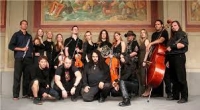 Haggard (/ˈhæɡərd/) is a German symphonic metal band founded in 1989. The group combines classical music and early music with death doom metal.Haggard was founded in 1989 and originally played death metal. They changed their musical style after their first demo tape, Introduction in 1992, becoming a band with symphonic melodies and classical instruments but folk themes. The album And Thou Shalt Trust... the Seer marked their breakthrough in 1997. After their second album Awaking the Centuries (the life of the prophet Nostradamus), they toured through Mexico twice. In 2004, they released their third album Eppur Si Muove which is about the life of Italian scholar Galileo Galilei, sentenced to house arrest for heresy by the Catholic Church for supporting Copernicus' claim that the Earth revolved around the sun.
Haggard (/ˈhæɡərd/) is a German symphonic metal band founded in 1989. The group combines classical music and early music with death doom metal.Haggard was founded in 1989 and originally played death metal. They changed their musical style after their first demo tape, Introduction in 1992, becoming a band with symphonic melodies and classical instruments but folk themes. The album And Thou Shalt Trust... the Seer marked their breakthrough in 1997. After their second album Awaking the Centuries (the life of the prophet Nostradamus), they toured through Mexico twice. In 2004, they released their third album Eppur Si Muove which is about the life of Italian scholar Galileo Galilei, sentenced to house arrest for heresy by the Catholic Church for supporting Copernicus' claim that the Earth revolved around the sun.
Assis Valente
 Assis Valente Musical composer Born: March 19, 1911, Santo Amaro, State of Bahia, Brazil Died: March 6, 1958, Rio de Janeiro, State of Rio de Janeiro, Brazil Albums: Assis Valente (Acervo Funarte), MOR
Assis Valente Musical composer Born: March 19, 1911, Santo Amaro, State of Bahia, Brazil Died: March 6, 1958, Rio de Janeiro, State of Rio de Janeiro, Brazil Albums: Assis Valente (Acervo Funarte), MOR
Gavin DeGraw
 Gavin DeGraw (born February 4, 1977) is an American singer-songwriter and musician.
Gavin DeGraw (born February 4, 1977) is an American singer-songwriter and musician.Originally, DeGraw started in Manhattan clubs alongside local pianists Andrew West and Lenny Revell, drawing several of his home town fans. He made his big break when "I Don't Want to Be" was chosen as the theme song for the teen drama One Tree Hill. The song has also been performed on American Idol, Australian Idol and Idol (Norway and Sweden) by various contestants during different seasons. Two of DeGraw's other songs, "Follow Through" and "Chariot," have also achieved popularity and radio play. His song "We Belong Together" was also featured in the 2006 film Tristan and Isolde. In 2004, DeGraw released an acoustic version of his album Chariot called Chariot Stripped. DeGraw and his band recorded the album live in the studio, in only one take on the vocals, seeking an intimate effect.
Gershwin & Heifetz
Jascha Heifetz (1901-1987) and George Gershwin (1898-1937), two of the best known figures in American music, were good friends and often played together.
Anthony Philip Heinrich
 Anthony Philip Heinrich was the first "full-time" American composer, and the most prominent before the American Civil War. He did not start composing until he was 36, after losing his business fortune in the Napoleonic Wars.
Anthony Philip Heinrich was the first "full-time" American composer, and the most prominent before the American Civil War. He did not start composing until he was 36, after losing his business fortune in the Napoleonic Wars.
Marc Shaiman
 Marc Shaiman is an American composer and lyricist for films, television, and theatre, best known for his collaborations with lyricist and director Scott Wittman. He wrote the music and co-wrote the lyrics for the Broadway musical version of the John Waters film Hairspray.
Marc Shaiman is an American composer and lyricist for films, television, and theatre, best known for his collaborations with lyricist and director Scott Wittman. He wrote the music and co-wrote the lyrics for the Broadway musical version of the John Waters film Hairspray.
Abbie Betinis
 Abbie Betinis (born January 21, 1980) is an American composer. She has composed music for a variety of musical ensembles, and is best known for her choral music and other vocal works.Abbie Betinis's music has been described as "inventive richly melodic" (The New York Times), "the highlight... bold...cathartic" (The Boston Globe), and as "intricate...with an inescapable allure." Her catalog of sixty commissioned works includes projects for the American Choral Directors Association, American Suzuki Foundation, Cantus, The Dale Warland Singers, James Sewell Ballet, The Rose Ensemble, The Schubert Club, Young New Yorkers' Chorus, and Zeitgeist.Having quickly emerged as one of the strongest voices in American choral composition today, Betinis chooses meaningful texts to set in a unique, yet accessible style. Her early residencies with The Rose Ensemble and The Singers—Minnesota Choral Artists (the latter for 10 years), helped to shape her sensibilities as a composer of vocal music and to explore and employ unconventional techniques, such as yodeling, spitting, whistling, glottal stops, and keening.
Abbie Betinis (born January 21, 1980) is an American composer. She has composed music for a variety of musical ensembles, and is best known for her choral music and other vocal works.Abbie Betinis's music has been described as "inventive richly melodic" (The New York Times), "the highlight... bold...cathartic" (The Boston Globe), and as "intricate...with an inescapable allure." Her catalog of sixty commissioned works includes projects for the American Choral Directors Association, American Suzuki Foundation, Cantus, The Dale Warland Singers, James Sewell Ballet, The Rose Ensemble, The Schubert Club, Young New Yorkers' Chorus, and Zeitgeist.Having quickly emerged as one of the strongest voices in American choral composition today, Betinis chooses meaningful texts to set in a unique, yet accessible style. Her early residencies with The Rose Ensemble and The Singers—Minnesota Choral Artists (the latter for 10 years), helped to shape her sensibilities as a composer of vocal music and to explore and employ unconventional techniques, such as yodeling, spitting, whistling, glottal stops, and keening.
Roy Hargrove
 Roy Anthony Hargrove was an American jazz trumpeter. He won worldwide notice after winning two Grammy Awards for differing types of music in 1997 and in 2002. Hargrove primarily played in the hard bop style for the majority of his albums, especially performing jazz standards on his 1990s albums
Roy Anthony Hargrove was an American jazz trumpeter. He won worldwide notice after winning two Grammy Awards for differing types of music in 1997 and in 2002. Hargrove primarily played in the hard bop style for the majority of his albums, especially performing jazz standards on his 1990s albums
Darius Milhaud
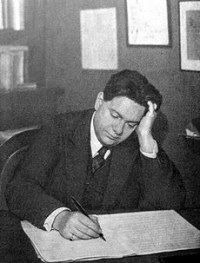 Darius Milhaud (French pronunciation: ; 4 September 1892 – 22 June 1974) was a French composer and teacher. He was a member of Les Six—also known as The Group of Six—and one of the most prolific composers of the 20th century. His compositions are influenced by jazz and make use of polytonality (music in more than one key at once).
Darius Milhaud (French pronunciation: ; 4 September 1892 – 22 June 1974) was a French composer and teacher. He was a member of Les Six—also known as The Group of Six—and one of the most prolific composers of the 20th century. His compositions are influenced by jazz and make use of polytonality (music in more than one key at once).
The Sims
 The Sims is a strategic life-simulation computer game developed by Maxis and published by Electronic Arts. It was created by game designer Will Wright, also known for developing SimCity. It is a simulation of the daily activities of one or more virtual persons ("Sims") in a suburban household near SimCity.
The Sims is a strategic life-simulation computer game developed by Maxis and published by Electronic Arts. It was created by game designer Will Wright, also known for developing SimCity. It is a simulation of the daily activities of one or more virtual persons ("Sims") in a suburban household near SimCity.The Sims was first released on February 4, 2000 (one day before Chinese New Year). By March 22, 2002, The Sims had sold more than 6.3 million copies worldwide, making it the best-selling PC game in history; the game has shipped 16 million copies worldwide as of February 7, 2005. Since its initial release, seven expansion packs and sequels, The Sims 2 and the new prequel The Sims 3 (each with their own expansion packs), have been released. The Sims has won numerous awards, including GameSpot's "Game of the Year Award" for 2000.
Galt MacDermot
 Arthur Terence Galt MacDermot was a Canadian-American composer, pianist and writer of musical theatre. He won a Grammy Award for the song "African Waltz" in 1960. His most successful musicals were Hair and Two Gentlemen of Verona.
Arthur Terence Galt MacDermot was a Canadian-American composer, pianist and writer of musical theatre. He won a Grammy Award for the song "African Waltz" in 1960. His most successful musicals were Hair and Two Gentlemen of Verona.
Scott Joplin
 Scott Joplin (between June 1867 and January 1868 – April 1, 1917) was an American musician and composer of ragtime music. He remains the best-known ragtime figure and is regarded as one of the three most important composers of classic ragtime, along with James Scott and Joseph Lamb, and also a precursor to Stride Piano. Decades after his death, his music enjoyed a considerable surge of popularity and critical respect in the 1970s, especially for his most famous composition, "The Entertainer."
Scott Joplin (between June 1867 and January 1868 – April 1, 1917) was an American musician and composer of ragtime music. He remains the best-known ragtime figure and is regarded as one of the three most important composers of classic ragtime, along with James Scott and Joseph Lamb, and also a precursor to Stride Piano. Decades after his death, his music enjoyed a considerable surge of popularity and critical respect in the 1970s, especially for his most famous composition, "The Entertainer."Even at the time of publication, Joplin's publisher John Stark was claiming that the rags had obtained classical status, and "lifted ragtime from its low estate and lined it up with Beethoven and Bach".
Gustav Holst
 Gustav Theodore Holst (21 September 1874 – 25 May 1934) was an English composer and was a music teacher for nearly 20 years. He is most famous for his orchestral suite The Planets. Having studied at the Royal College of Music in London, his early work was influenced by Ravel, Grieg, Richard Strauss, and fellow student Ralph Vaughan Williams, but most of his music is highly original, with influences from Hindu spiritualism and English folk tunes. Holst's music is well known for unconventional use of metre and haunting melodies.
Gustav Theodore Holst (21 September 1874 – 25 May 1934) was an English composer and was a music teacher for nearly 20 years. He is most famous for his orchestral suite The Planets. Having studied at the Royal College of Music in London, his early work was influenced by Ravel, Grieg, Richard Strauss, and fellow student Ralph Vaughan Williams, but most of his music is highly original, with influences from Hindu spiritualism and English folk tunes. Holst's music is well known for unconventional use of metre and haunting melodies.Holst wrote almost 200 catalogued compositions, including orchestral suites, operas, ballets, concertos, choral hymns, and songs (see Selected works below).
Holst became music master at St Paul's Girls' School in 1905 and director of music at Morley College in 1907, continuing in both posts until retirement.
He was the brother of Hollywood actor Ernest Cossart and father of the composer and conductor Imogen Holst, who wrote a biography of him in 1938.
Emilio Chamorro
 Emilio Chamorro, el Tata, a veces con el seudónimo de Emilio del Campo (1904-1971), fue un conocido músico y guitarrista, considerado como uno de los pioneros del chamamé y la música litoraleña, de Argentina. En 1931 formó el primer conjunto famoso de chamamé, llamado Los Hijos de Corrientes, considerado como una "escuela chamamecera",1 integrado por músicos que luego serían famosos como Tránsito Cocomarola, Isaco Abitbol, Tarragó Ros, Ernesto Montiel y muchos otros. Entre 1944 y 1945 estableció en la ciudad de Rosario el "boliche" bailable La Ranchada,2 que se constituyó en el centro más importante de difusión del chamamé. Entre sus canciones exitosas se destacan "San Luis", "Taragüí rapé" y "Lamento correntino".
Emilio Chamorro, el Tata, a veces con el seudónimo de Emilio del Campo (1904-1971), fue un conocido músico y guitarrista, considerado como uno de los pioneros del chamamé y la música litoraleña, de Argentina. En 1931 formó el primer conjunto famoso de chamamé, llamado Los Hijos de Corrientes, considerado como una "escuela chamamecera",1 integrado por músicos que luego serían famosos como Tránsito Cocomarola, Isaco Abitbol, Tarragó Ros, Ernesto Montiel y muchos otros. Entre 1944 y 1945 estableció en la ciudad de Rosario el "boliche" bailable La Ranchada,2 que se constituyó en el centro más importante de difusión del chamamé. Entre sus canciones exitosas se destacan "San Luis", "Taragüí rapé" y "Lamento correntino".
Chick Corea
 Armando Anthony "Chick" Corea (born June 12, 1941) is a multiple Grammy Award-winning American jazz pianist, keyboardist, drummer, and composer.
Armando Anthony "Chick" Corea (born June 12, 1941) is a multiple Grammy Award-winning American jazz pianist, keyboardist, drummer, and composer.He is known for his work during the 1970s in the genre of jazz fusion. He participated in the birth of the electric fusion movement as a member of Miles Davis' band in the 1960s, and in the 1970s formed Return to Forever.
He continued to pursue other collaborations and explore various musical styles throughout the 1980s and 1990s. He is also known for promoting Scientology.
Henry Mancini
 Henry Mancini (April 16, 1924 – June 14, 1994) was an American composer, conductor and arranger. He is remembered particularly for being a composer of film and television scores. Mancini also won a record number of Grammy awards, including a Grammy Lifetime Achievement Award in 1995. His best-known works are the jazz-idiom theme to The Pink Panther film series ("The Pink Panther Theme"), the Peter Gunn Theme (from the so-named series) and "Moon River".
Henry Mancini (April 16, 1924 – June 14, 1994) was an American composer, conductor and arranger. He is remembered particularly for being a composer of film and television scores. Mancini also won a record number of Grammy awards, including a Grammy Lifetime Achievement Award in 1995. His best-known works are the jazz-idiom theme to The Pink Panther film series ("The Pink Panther Theme"), the Peter Gunn Theme (from the so-named series) and "Moon River".Mancini was nominated for an unprecedented 72 Grammys, winning 20. Additionally he was nominated for 18 Academy Awards, winning four. He also won a Golden Globe Award and was nominated for two Emmys.
Mancini won a total of four Oscars for his music in the course of his career. He was first nominated for an Academy Award in 1955 for his original score of The Glenn Miller Story, on which he collaborated with Joseph Gershenson. He lost out to Adolph Deutsch and Saul Chaplin's Seven Brides for Seven Brothers. In 1962 he was nominated in the Best Music, Original Song category for "Bachelor in Paradise" from the film of the same name, in collaboration with lyricist Mack David. That song did not win. However, Mancini did receive two Oscars that year: one in the same category, for the song "Moon River" (shared with lyricist Johnny Mercer), and one for "Best Music, Scoring of a Dramatic or Comedy Picture" for Breakfast at Tiffany's. The following year, he and Mercer took another Best Song award for "Days of Wine and Roses," another eponymous theme song. His next eleven nominations went for naught, but he finally garnered one last statuette working with lyricist Leslie Bricusse on the score for Victor/Victoria, which won the "Best Music, Original Song Score and Its Adaptation or Best Adaptation Score" award for 1983. All three of the films for which he won were directed by Blake Edwards. His score for Victor/Victoria was adapted for the 1995 Broadway musical of the same name.
Joachim Andersen
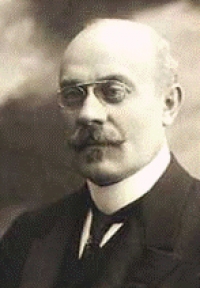 Carl Joachim Andersen (April 29, 1847 – May 7, 1909) was a Danish flutist, conductor and composer born in Copenhagen, son of the flutist Christian Joachim Andersen. Both as a virtuoso and as composer of flute music, he is considered one of the best of his time. He was a tough leader and teacher and demanded as such a lot from his orchestras but through that style he reached a high level.
Carl Joachim Andersen (April 29, 1847 – May 7, 1909) was a Danish flutist, conductor and composer born in Copenhagen, son of the flutist Christian Joachim Andersen. Both as a virtuoso and as composer of flute music, he is considered one of the best of his time. He was a tough leader and teacher and demanded as such a lot from his orchestras but through that style he reached a high level.
Mozart
 Wolfgang Amadeus Mozart, full name Johann Chrysostom Wolfgang Amadeus Mozart (27 January 1756 â 5 December 1791) was a prolific and influential composer of the Classical era. His over 600 compositions include works widely acknowledged as pinnacles of symphonic, concertante, chamber, piano, operatic, and choral music. Mozart is among the most enduringly popular of classical composers, and many of his works are part of the standard concert repertoire.
Wolfgang Amadeus Mozart, full name Johann Chrysostom Wolfgang Amadeus Mozart (27 January 1756 â 5 December 1791) was a prolific and influential composer of the Classical era. His over 600 compositions include works widely acknowledged as pinnacles of symphonic, concertante, chamber, piano, operatic, and choral music. Mozart is among the most enduringly popular of classical composers, and many of his works are part of the standard concert repertoire.Mozart's music, like Haydn's, stands as an archetypal example of the Classical style. His works spanned the period during which that style transformed from one exemplified by the style galant to one that began to incorporate some of the contrapuntal complexities of the late Baroque, complexities against which the galant style had been a reaction. Mozart's own stylistic development closely paralleled the development of the classical style as a whole. In addition, he was a versatile composer and wrote in almost every major genre, including symphony, opera, the solo concerto, chamber music including string quartet and string quintet, and the piano sonata. While none of these genres were new, the piano concerto was almost single-handedly developed and popularized by Mozart. He also wrote a great deal of religious music, including masses; and he composed many dances, divertimenti, serenades, and other forms of light entertainment.
The central traits of the classical style can be identified in Mozart's music. Clarity, balance, and transparency are hallmarks of his work.
Mykola Leontovych
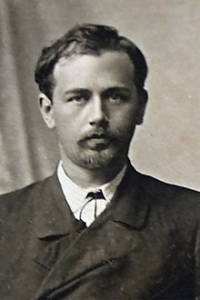 Mykola Dmytrovych Leontovych (Ukrainian: Микола Дмитрович Леонтович; sometimes spelt Leontovich; December 13 1877 – 23 January 1921) was a Ukrainian composer, choral conductor, and teacher of international renown. His music was inspired by Mykola Lysenko and the Ukrainian National Music School. Leontovych specialised in a cappella choral music, ranging from original compositions, to church music, to elaborate arrangements of folk music.
Mykola Dmytrovych Leontovych (Ukrainian: Микола Дмитрович Леонтович; sometimes spelt Leontovich; December 13 1877 – 23 January 1921) was a Ukrainian composer, choral conductor, and teacher of international renown. His music was inspired by Mykola Lysenko and the Ukrainian National Music School. Leontovych specialised in a cappella choral music, ranging from original compositions, to church music, to elaborate arrangements of folk music.
David Bowie
 David Bowie (born David Robert Jones on 8 January 1947) is an English musician, actor, producer, and arranger. Active in five decades of rock music and frequently reinventing his music and image, Bowie is regarded as an influential innovator, particularly for his work through the 1970s.
David Bowie (born David Robert Jones on 8 January 1947) is an English musician, actor, producer, and arranger. Active in five decades of rock music and frequently reinventing his music and image, Bowie is regarded as an influential innovator, particularly for his work through the 1970s.Although he released an album and numerous singles earlier, David Bowie first caught the eye and ear of the public in the autumn of 1969, when his space-age mini-melodrama "Space Oddity" reached the top five of the UK singles chart. After a three-year period of experimentation he re-emerged in 1972 during the glam rock era as a flamboyant, androgynous alter ego Ziggy Stardust, spearheaded by the hit single "Starman" and the album The Rise and Fall of Ziggy Stardust and the Spiders from Mars. The relatively short-lived Ziggy persona epitomised a career often marked by musical innovation, reinvention and striking visual presentation.
In 1975, Bowie achieved his first major American crossover success with the number-one single "Fame" and the hit album Young Americans, which the singer identified as "plastic soul". The sound constituted a radical shift in style that initially alienated many of his UK devotees. He then confounded the expectations of both his record label and his American audiences by recording the minimalist album Low – the first of three collaborations with Brian Eno. Arguably his most experimental works to date, the so-called "Berlin Trilogy" nevertheless produced three UK top-five albums.
After uneven commercial success in the late 1970s, Bowie had UK number ones with the 1980 single "Ashes to Ashes" and its parent album, Scary Monsters (and Super Creeps). He paired with Queen for the 1981 UK chart-topper "Under Pressure", but consolidated his commercial – and, until then, most profitable – sound in 1983 with the album Let's Dance, which yielded the hit singles "China Girl", "Modern Love", and most famously, the title track.
In the BBC's 2002 poll of the 100 Greatest Britons, Bowie ranked 29. Throughout his career he has sold an estimated 196 million albums,
A-Lin
In 1999, when A-Lin was 16 years old and taught children to sing the hymn "Amazing Grace" after the 1999 Jiji earthquake in Nantou County, she was discovered by her former agent. However, he was not available when she wanted to give him contact information. Fortunately, four years later, A-Lin met him again in a bar where she sang regularly. She was officially offered a singing contract.
LINCOLN BREWSTER
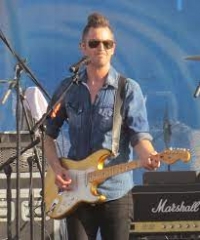 Lincoln Brewster (born July 30, 1971) is an American contemporary Christian musician and worship pastor. As a guitarist, singer, and songwriter, Brewster became a sought-after session guitarist in the early 90s. Brewster is the senior worship pastor at Bayside Church in Granite Bay, California.
Lincoln Brewster (born July 30, 1971) is an American contemporary Christian musician and worship pastor. As a guitarist, singer, and songwriter, Brewster became a sought-after session guitarist in the early 90s. Brewster is the senior worship pastor at Bayside Church in Granite Bay, California.
George Ratcliffe Woodward
 George Ratcliffe Woodward was an English Anglican priest who wrote mostly religious verse, both original and translated from ancient authors. The best-known of these were written to fit traditional melodies, mainly of the Renaissance
George Ratcliffe Woodward was an English Anglican priest who wrote mostly religious verse, both original and translated from ancient authors. The best-known of these were written to fit traditional melodies, mainly of the Renaissance
Johann Sebastian Bach
 Johann Sebastian Bach (31 March 1685 – 28 July 1750) was a German composer and musician of the Baroque period. He is known for instrumental compositions such as the Art of Fugue, the Brandenburg Concertos, and the Goldberg Variations, and for vocal music such as the St Matthew Passion and the Mass in B minor. Since the 19th-century Bach Revival he has been generally regarded as one of the greatest composers of the Western art musical canon.
Johann Sebastian Bach (31 March 1685 – 28 July 1750) was a German composer and musician of the Baroque period. He is known for instrumental compositions such as the Art of Fugue, the Brandenburg Concertos, and the Goldberg Variations, and for vocal music such as the St Matthew Passion and the Mass in B minor. Since the 19th-century Bach Revival he has been generally regarded as one of the greatest composers of the Western art musical canon.
Inuyasha
 InuYasha (犬夜叉?), full title InuYasha, a Feudal Fairy Tale (戦国御伽草子 犬夜叉 Sengoku Otogizōshi InuYasha?), is a Japanese manga series written and illustrated by Rumiko Takahashi. It premiered in Weekly Shōnen Sunday on November 13, 1996 and concluded on June 18, 2008. The series follows a half-demon, a time-traveling high school girl, a lecherous monk, a fox demon, and a demon slayer during the Sengoku period as they seek to find all the fragments of the Jewel of Four Souls and to keep them out of the hands of evildoers, especially Naraku.
InuYasha (犬夜叉?), full title InuYasha, a Feudal Fairy Tale (戦国御伽草子 犬夜叉 Sengoku Otogizōshi InuYasha?), is a Japanese manga series written and illustrated by Rumiko Takahashi. It premiered in Weekly Shōnen Sunday on November 13, 1996 and concluded on June 18, 2008. The series follows a half-demon, a time-traveling high school girl, a lecherous monk, a fox demon, and a demon slayer during the Sengoku period as they seek to find all the fragments of the Jewel of Four Souls and to keep them out of the hands of evildoers, especially Naraku.The manga was adapted as two anime television series produced by Sunrise. The first, broadcast for 167 episodes on Yomiuri TV in Japan from October 16, 2000 until September 13, 2004, was directed by Masashi Ikeda for the first forty-four episodes and by Yasunao Aoki for the remainder. The second series, called InuYasha: The Final Act, began airing October 3, 2009 to cover the rest of the manga series and ended on March 29, 2010.
Search for Free Sheet Music
You can make a search through the entire collection of sheets.
You can make a search through the entire collection of sheets.
Hi, fellow musicians!
There is no registration required to download the sheets but you can subscribe to our mailing list to get notified of new sheets.
There is no registration required to download the sheets but you can subscribe to our mailing list to get notified of new sheets.
Latest Artists
Ludvig Van Beethoven
× 1
Yiruma × 4
omoi × 1
Luis Pedro Bedmar Estrada × 1
The Carpenters × 1
Francesco Durante × 1
Bukas Palad Music Ministry × 1
Hoang Vie × 1
Bukas Palad × 1
The Supremes × 1
Voctave × 1
Howie Day × 1
Ludovico Einaudi × 3
Bob Watson × 1
Berklee College Of Music × 1
Vladimir Sterzer × 1
Chopin × 5
Vytauto Kernagio × 1
George Gershwin × 6
Clara Schumann × 1
Scott Joplin × 2
John Philip Sousa × 1
Gabriel Urbain Fauré × 1
Charles Aznavour × 1
Adam Schlesinger × 1
The Isley Brothers × 1
xavier naidoo × 1
James Dees × 1
Ennio Morricone × 1
Ottorino Respighi × 1
Lev Zemlinski × 1
Raymond Pauls × 1
Walt disney × 1
John Smith × 1
Jekyll and Hyde × 1
Carlos Hernani Macchi × 1
Justin Timberlake × 2
Stephen Rippy × 1
Luis MIguel × 1
Marvin Hamlisch × 1
Pink Martini × 1
Aram Khachaturian × 1
Steve Baker × 1
Thelonious Monk × 1
Tony Hatch × 1
Jay Chou × 4
fats waller × 1
Jay Chattaway × 1
Mozart × 8
Moulin Rouge! × 1
Yiruma × 4
omoi × 1
Luis Pedro Bedmar Estrada × 1
The Carpenters × 1
Francesco Durante × 1
Bukas Palad Music Ministry × 1
Hoang Vie × 1
Bukas Palad × 1
The Supremes × 1
Voctave × 1
Howie Day × 1
Ludovico Einaudi × 3
Bob Watson × 1
Berklee College Of Music × 1
Vladimir Sterzer × 1
Chopin × 5
Vytauto Kernagio × 1
George Gershwin × 6
Clara Schumann × 1
Scott Joplin × 2
John Philip Sousa × 1
Gabriel Urbain Fauré × 1
Charles Aznavour × 1
Adam Schlesinger × 1
The Isley Brothers × 1
xavier naidoo × 1
James Dees × 1
Ennio Morricone × 1
Ottorino Respighi × 1
Lev Zemlinski × 1
Raymond Pauls × 1
Walt disney × 1
John Smith × 1
Jekyll and Hyde × 1
Carlos Hernani Macchi × 1
Justin Timberlake × 2
Stephen Rippy × 1
Luis MIguel × 1
Marvin Hamlisch × 1
Pink Martini × 1
Aram Khachaturian × 1
Steve Baker × 1
Thelonious Monk × 1
Tony Hatch × 1
Jay Chou × 4
fats waller × 1
Jay Chattaway × 1
Mozart × 8
Moulin Rouge! × 1





